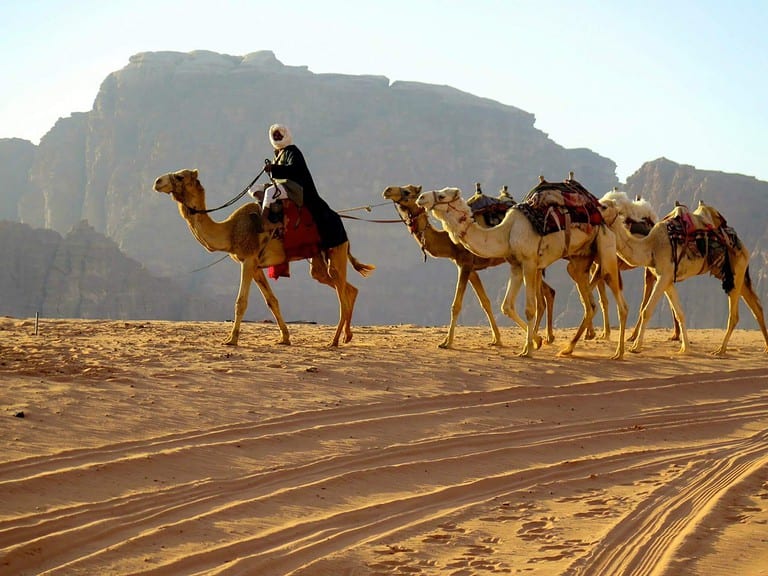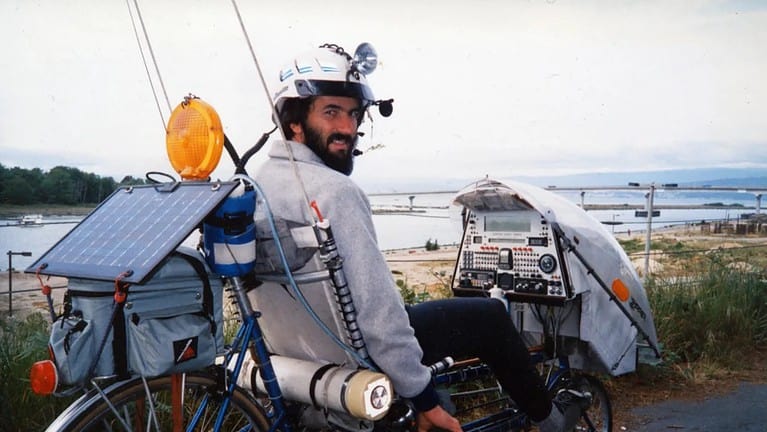What is the "Nomad Lifestyle"
The modern workforce and technology have enabled a growing trend toward remote work and location independence. As a result, a new category of workers has emerged, known as digital nomads. These are people who leverage technology to work remotely and live a location-independent lifestyle.
In this article, we will explore what exactly a digital nomad is. We’ll look at how advances in technology and internet connectivity have facilitated this remote work style. We’ll also learn about the typical characteristics and habits of digital nomads. Finally, we’ll consider the pros and cons of the digital nomad lifestyle.
The digital nomad lifestyle is dramatically different from a traditional office job. By understanding what a digital nomad is and what the lifestyle entails, you can better evaluate if it could be right for you. The world of work is changing rapidly, and digital nomads represent an emerging workforce trend.
So, what exactly is this new nomadic lifestyle that so many people are deciding to embark on, and could it be right for you?
Defining the Nomad Lifestyle and a bit of history about it
Human nomadism is a way of life that involves frequent travel and the absence of permanent settlements. For thousands of years, it has been an important element of human history, influencing civilizations and society. Here’s a quick rundown of human nomadism’s history. Digital nomadism is not a new movement, but just the modern or contemporary – if you want to call it that, version of people living everywhere.
Human nomadism has been an intriguing aspect of human history that extends back to the earliest times when hunter-gatherers wandered in quest of sustenance. They lived in makeshift shelters, constantly adjusting to their surroundings. With the domestication of animals such as sheep, goats, and cattle, the Neolithic Era signified a tremendous transition. As humans began to wander periodically in search of new grazing grounds for their herds, this development laid the groundwork for pastoral nomadism.

Even to the current day, there are still “classic” nomad tribes that still exist, like the Tuareg in the Sarah desert
Nomadic communities on the Eurasian steppes gained superior metalworking capabilities throughout the Bronze Age, allowing them to trade with sedentary civilizations. These nomads were critical in the movement of products and ideas between East and West. Some nomadic cultures, such as the Huns, Mongols, and Turkic peoples, were famous for their military victories, changing history via huge migrations and impacts.
The Silk Road, a complex network of trade routes, united nomadic and sedentary populations throughout Asia, the Middle East, and Europe, facilitating cultural exchange and economic relations. Traditional nomadism began to decrease in many places as empires were established and transportation improved. Nonetheless, certain nomadic civilizations, such as the Bedouins of the Arabian Desert, have survived.
In the modern era, nomadic traditions have experienced revivals in various forms. Digital nomads, van dwellers, and wanderers adopt nomadic lifestyles by choice, often relying on technology to support their mobility. However, modern nomadism faces challenges related to environmental sustainability, land rights, and the preservation of traditional cultures. Balancing traditional practices with contemporary pressures remains a complex issue in the ongoing story of human nomadism.

The contemporary digital nomad might go back all the way in 1998. Read more about Steve Roberts here. [Photo courtesy of Fast Company]
Types of Nomad Life and Living
Digital nomads are not only people who travel by plane and live in nice flats or expensive hotels. The world of remote workers is wider. There are people exploring the world in vans, RVs, couchsurfing, and even sailing.
For example, van lifers outfit modest vans as their full-time homes, embracing minimalism and mobility. RVers tow all the comforts of home in recreational vehicles, forming communities with fellow travelers. Budget-conscious nomads couch surf, staying with locals for free accommodation.
Other adventurous souls set sail on boats, working remotely at sea when WiFi is available in ports. The digital nomad lifestyle opens up diverse, affordable ways of living on the move. As long as they have a laptop and internet connection, remote workers can choose alternative modes of travel like vans, RVs, couch surfing, or sailing boats to journey off the beaten path. And now, there are new ways to get your internet in the wilderness, like the Starlink, where you just need a dish pointed at a satellite which you can install literally anywhere.
Let’s look at a few “types” of nomads and see how they organise their lives and work on the go.
Furthermore, nomads are often more conscious of their consuming trends. Being on the go motivates people to buy locally and sustainably sourced items, therefore supporting companies that prioritise eco-friendly practices. This conscious attitude extends to their daily decisions, impacting the sustainability of the sites they frequent.
Finally, the nomadic lifestyle creates a greater respect for the natural world. Many nomads participate in outdoor activities and explore natural surroundings, which could increase their awareness of environmental challenges. This increased understanding frequently drives individuals to take action to protect the environment, reaffirming their commitment to sustainability.
Get our best tips FOR FREE and learn how to become a successful digital nomad and work from anywhere!
PLUS top advice on everything related to location independence lifestyle:
- Coliving
- Working locations
- Making money online
- Travel advice
- Nomad interviews
Van life and RV Enthusiasts
RV and Van Lifers embrace a nomadic lifestyle centered around living in recreational vehicles (RVs) or converted vans. This lifestyle offers them the freedom to travel extensively, explore diverse landscapes, and embrace a minimalist, mobile existence. The choice of vehicle varies, including motorhomes, camper vans, travel trailers, and converted cargo vans, depending on budget, space requirements, and travel preferences.
The mobility provided by RVs and vans is a significant attraction. Nomads can easily change locations, whether it’s for a weekend getaway, a cross-country road trip, or an extended journey. This freedom to roam and explore at will is a defining feature of the lifestyle.
Many RVs and vans are equipped with essential amenities like sleeping quarters, kitchenettes, and bathrooms, allowing nomads to enjoy a level of comfort while on the road. However, the limited space encourages minimalism, forcing travelers to carefully curate their belongings, prioritize essentials, and find creative storage solutions.
Adventure and exploration are core elements of RV and van life. Nomads can visit national parks, camp in remote wilderness areas, and discover hidden gems across the country or even internationally. This lifestyle encourages a profound connection with the great outdoors and the thrill of the open road.
A sense of community often emerges among RV and van lifers on the road. They connect with fellow travelers at campgrounds, RV parks, and through online forums, sharing valuable tips, experiences, and a sense of camaraderie that adds depth to their journeys.
Living in an RV or van can be cost-effective, eliminating the need for traditional mortgages or rent, and significantly reducing expenses like utility bills. Many nomads find ways to work remotely or pick up temporary jobs along their journey to support their lifestyle and fund their adventures.
Sustainability is another consideration, with some nomads using solar panels for electricity, practicing responsible waste disposal, and seeking out eco-conscious campgrounds to reduce their environmental impact.
Challenges are inherent in this lifestyle, including adapting to changing weather conditions, navigating unfamiliar roads, and addressing maintenance issues with their vehicles. Yet, the rewards of a life filled with exploration, self-sufficiency, and adventure often outweigh the challenges.
RV and van lifers may follow seasonal travel patterns, migrating to warmer climates in the winter and cooler regions in the summer, enjoying comfortable weather year-round. Remote work, freelance opportunities, and entrepreneurship enable them to find a better work-life balance.
Families traveling in RVs and vans often choose homeschooling, incorporating real-world experiences and outdoor learning into their children’s education. Some plan detailed itineraries, while others prefer to go wherever the road takes them, embracing the spontaneity of the journey.
Sailors and Boaters
“Sailors and Boaters” are a different type of nomads who have adopted a lifestyle centred on living on various forms of boats. This way of life allows people to explore coastal regions, islands, and even open oceans while living aboard their boat or yacht as their primary home. Depending on personal tastes and the adventures sought, watercraft can range from sailboats and motor yachts to houseboats and smaller vessels such as canoes or kayaks.
The ability to explore the seaside is one of the lifestyle’s unique aspects. These nomads can moor in secret coves, explore distant beaches, and visit locations that are frequently unreachable by land. The water becomes their home as well as their gateway to new adventures.
These nomads have a strong feeling of community and solidarity. They often establish close-knit communities in marinas, yacht clubs, or while travelling in flotillas. During their journeys, these groups provide social support, shared knowledge, and companionship, fostering a sense of belonging.
Living on the water has unique obstacles, such as coping with bad weather conditions, continual maintenance concerns, and the need for adaptation. Sailors and boaters must be prepared for shifting conditions and acquire the resilience to manage both calm and difficult waters.
Sailing and boating are synonymous with freedom and adventure. They have the freedom to choose their own routes, choose their own locations, and immerse themselves in a continuously changing background of sea and sky.
We’ve covered some digital nomads at sea and their super interesting lives in some of our articles. You can read more about the PROs and CONs of living on a sailboat in this interview with boat nomads Ryan and Sophie or how Chris and Kelly got into a boat renovation project and started sailing the world.
Tiny homes on wheels
Tiny house dwellers are people who have decided to live a minimalist and compact lifestyle by living in small, typically custom-built residences known as “tiny houses.” These dwellings are often significantly smaller than regular residences, ranging in size from 100 to 400 square feet. This type of living emphasizes a minimalist lifestyle in which inhabitants assess their things carefully, resulting in a more purposeful and clutter-free existence.
Many tiny dwellings are custom-built to make the most of available space. To make the most of the available space, creative storage solutions like built-in furniture, fold-down beds, and multi-purpose furnishings are frequently integrated. Furthermore, tiny dwellings are frequently constructed with sustainability in mind.
They are energy-efficient and require fewer resources to build and maintain, making them an environmentally friendly housing choice.
Affordability is a major motivator for opting for tiny home living. Tiny houses are often far less expensive to build or buy than regular residences, and they frequently have fewer ongoing costs, such as electricity bills and property taxes. This affordability factor can provide people with a road to financial independence by allowing them to reduce or eliminate home debt.
The mobility of small dwellings is one of their distinguishing features. Some tiny houses are designed on wheels, allowing owners to effortlessly transport their homes from one site to another. This mobility allows you to explore new regions or live in other communities, which adds an exciting dimension to tiny home life.
In a number of parts of the world, communities of small home inhabitants have arisen, where like-minded people live in proximity to one another. These communities foster a feeling of collaboration and shared resources, giving people a distinct sense of belonging.
Many small house dwellers also embrace a DIY (do-it-yourself) culture, preferring to build and customize their dwellings themselves. This hands-on engagement personalizes their living area and strengthens their bond with their small homes.
Those interested in this lifestyle must navigate local laws and regulations carefully.
However, it’s crucial to note that tiny house living can present legal and zoning challenges in many areas due to varying regulations and building codes. Those interested in this lifestyle must navigate local laws and regulations carefully.
Furthermore, tiny house living can foster a strong sense of community engagement. Residents often participate in local initiatives, contribute to neighborhood projects, and promote sustainability in their communities.
Digital Minimalists

Benefits of the Nomad Lifestyle - Reasons to get into it
Being a nomad offers a lifestyle filled with enticing benefits. It grants the precious gifts of freedom and flexibility, allowing individuals to work from virtually anywhere, embracing new horizons and diverse cultures. This unique path promotes a harmonious work-life balance, enabling the pursuit of personal passions alongside professional endeavors while potentially yielding cost savings in lower-cost destinations.
Moreover, the nomadic journey fosters valuable connections through networking opportunities with people from various backgrounds. It serves as a catalyst for personal growth, nurturing adaptability, self-reliance, and problem-solving skills. The elimination of daily commutes reduces stress and environmental impact, contributing to a more sustainable lifestyle.
Beyond practical advantages, the nomadic lifestyle offers a wellspring of creative inspiration, sparked by ever-changing surroundings. It embarks adventurers on a journey of constant exploration and discovery, creating a life brimming with excitement and novel experiences.
Sustainability and Ethical Considerations
Digital nomads and sustainable living are linked by the deliberate choices that nomadic people make in their lifestyles. To begin with, nomads contribute greatly to sustainability by decreasing or even eliminating daily commute. Nomads work remotely, generally from their lodgings, as opposed to standard office workers, who frequently face long and carbon-intensive commutes. This decrease in transit not only reduces emissions but also relieves urban congestion.
Furthermore, when travelling, nomads frequently seek for eco-friendly hotels. They are more likely to select accommodations that prioritise sustainability through practises like as energy efficiency, waste minimization, and the use of renewable energy sources. This deliberate choice of accommodations helps to reduce their environmental effect throughout their stay.
Challenges of the Nomad Lifestyle - There are "downsides" too
Even though this life sounds spectacular for some, it does bring a series of challenges. that one has to consider before getting in. (but hey, it’s not a big deal if you try and doesn’t work). We’ll just point some of the downsides below so you get a good idea of what it means from a critical standpoint.
First of all, finding reliable wifi and fast internet speeds can become a daily quest as you wander to new destinations, cafes, and makeshift workspaces.Even worse, if you are using
Building meaningful connections and a sense of community is an ongoing effort as you trade roots for the open road. The comforts of home are replaced by a string of temporary spaces.
Navigating visas, permits, and evolving regulations requires research, planning, and flexibility as you cross borders and immerse in new cultures and laws. The legal landscape is perpetually shifting.
Seeking affordable short-term housing that meets your needs is a constant chore without the stability of long-term rental. You sacrifice convenience for freedom and mobility.
Maintaining focus and uninterrupted workflows takes discipline without the structure of routine. The rhythm of work and life is frequently disrupted.
Securing insurance and healthcare coverage on the go can be a challenge without a home base. You trade localized care for mobility and adventure.
Battle-tested resilience wards off burnout from the exhilaration and fatigue of nonstop motion. Rest and recovery keep you energized and engaged.
While intoxicating at first, rootlessness can breed loneliness. You trade physical home for global homelessness, stable community for digital nomadism.
The digital nomad life offers reward and self-discovery, but demands resilience, planning, and constant recalibration. You abandon roots to cultivate new ground.
Now what?
So, having seen all this, is nomad life for you?
If you want to go ahead and give it a try, check out some of our resources below that will help you migrate safely and smoothly into a (digital) nomad lifestyle.
Our mission at Remote Tribe is to help people like yourself transition into one of these lifestyles that offers freedom and flexibility. We’ve helped thousands of other people go remote, and you are in good hands now. So you won’t be alone.
Learn from our mistakes and resources too, and get initiated quickly in any of these nomadic lifestyles.

Online Magazine
Explore our blog and discover insights on transitioning into a digital nomadic lifestyle,from destination choices and co-living to citizenship and jobs.

Private Community
Network with a community of digital nomads and remote work pioneers. Join exclusive live sessions, get insider tips, learn how to optimize taxes, and more.
No-Code Academy

Join our NO-CODE academy and learn how to build an online business. Over 40 hours of tutorials spanning platforms like Zappier, Webflow, and more
Newsletter

Stay updated with news and exclusive offers through our bi-monthly newsletter designed for remote workers and nomads. No spam, just great insights.
FAQ
The nomad lifestyle provides the ultimate adventure and boundless horizons for those driven by wanderlust, new experiences, human connections, and breaking geographical chains. Where some see boredom and fear, nomads see vibrant lives of possibility and discovery.
The nomad lifestyle represents a way of living that prioritizes mobility, flexibility, and independence over stability and permanence.
Rather than settling down in one place, nomads hit the open roads and skies, following opportunities, experiences, and personal growth around the globe. They live location-independent lifestyles enabled by remote work, freelancing, or running online businesses. Their income and priorities are directed towards the journey rather than material possessions.
Most of the digital nomad or remote jobs are related to fields which don’t need a physical presence in the office. The top 10 categories according to flexjobs.com are below. Need a remote job? Visit our remote jobs portal here.
- Marketing
- Writing
- Computer & IT
- Education
- Bilingual
- Accounting & Finance
- Graphic Design
- HR & Recruiting
- Project Management
- Business Development
Why not as soon as possible? One great piece of advice we can give is you should be financially ready when dive into this lifestyle. Either have savings for a year or already get on the road with a remote job.
Also, keep in mind: planning to become a digital nomad is an exciting but meticulous process. It involves financial preparation, selecting suitable destinations, arranging accommodations, and developing the right mindset to thrive in a nomadic existence. With careful planning and a passion for both work and adventure, the digital nomad lifestyle can be an immensely fulfilling and liberating experience.


